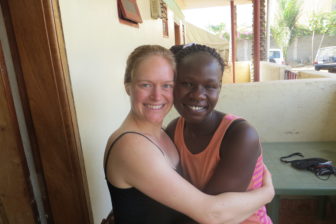Women in South Sudan: Paska’s Perspective
A voice in Juba Makes it to San Francisco
The following is written by Caroline Schulberg, a high school student in San Francisco who reached out the Rebuild South Sudan because she wanted to know how she could help.
In an effort to get a real understanding of the current situation in South Sudan, I reached out to Paska, a woman in South Sudan. She’s a business administrator who is a citizen of South Sudan and lives in the main city, Juba, where she manages a guest house. I had read articles, news stories, and watched documentaries of the current crisis in South Sudan, but I had not yet talked to someone who is actually experiencing the civil war and famine on a first hand basis. Not only did I want to get a better perception of what life is like in South Sudan, I also wanted to ask Paska how the rest of the world can help. Needless to say, her responses were more raw and direct than what I could have imagined. Paska provides astute wisdom to the problems, but never once had a tone of negativity. Just by reading her responses, one can feel the sense of hope that the people of South Sudan still have for their country.
I began by first asking Paska a broad question in order to get a full understanding as to why there is such a scarce amount of food in South Sudan. I wanted to know how the civil war had affected the citizen’s access to food. According to Paska, there are three main factors affecting the decline of food in South Sudan. These three factors are political, natural, and economic. When Paska told me that political factors were affecting the food security it immediately caught my attention because I would have not thought that politics could contribute to a lack of food. Paska continued to tell me that, “…this is because people cannot settle in their villages to cultivate for their own consumption unlike other countries where people have freedom and liberty. As a result of insecurity, people have vacated their home villages to settle in the city (Juba) where there is no free land for cultivation.” The response revealed the true lack of freedom that many South Sudanese endure due to the rulings of the government. Paska informed me that natural factors like drought and climate changes have also led to the decline of food security in South Sudan.
Economic factors also play a big role in the lack of food. Paska said, “South Sudan as a country imports most of its food items from the neighboring countries like Uganda, Kenya and Sudan. So in case of an economic crisis like this of current, these Countries tend to charge high prices for their commodities making it difficult for the locals to afford any food.” In any nation these factors can cause a decline in food, but it is especially true in an already poverty-stricken country like South Sudan.
I then wanted to ask Paska if she thought there were any solutions that could be made to end the civil war. I was curious as to whether there was a direct correlation between the civil war and the lack of food security. Paska’s response was very optimistic. Paska focused on three areas that can be done to improve the situation: equally distribute resources and power; increase education, and create a common identity. It is important that the government equally distributes the resources of different regions throughout the country, not just in the region that the resource is derived from. Education is a critical factor in the overall health of a more successful South Sudan. While literacy rates are improving, many people still need literacy skills, especially the youth. Paska said, “This makes it very difficult to sensitize such groups of people about the disadvantages of civil war, but if people turn to education and widen their degree of thinking, it can mark an end to this.”
Lastly, Paska emphasized the importance for people to integrate their ethnic identities with their larger common South Sudanese identity. This is very much a plea for those involved in killing and fighting to see the humanity in all South Sudanese people. Paska believes that it is important for laws which prohibit killing and protect freedom of speech to be upheld.
After my interview with Paska, I realized that the most prevalent problems in South Sudan stem from the corrupt ruling of the government. I learned that the people of South Sudan are optimistic human beings. They have hope in the good of the people, but fear that no change will be seen unless the government changes. With support and encouragement from people all around the world, South Sudan may become the country that it’s citizens hoped for it to be when they gained independence in 2011.






